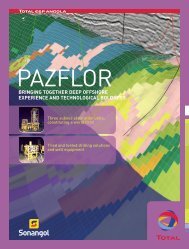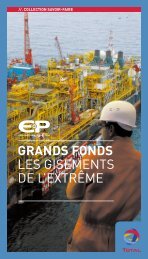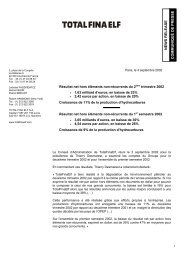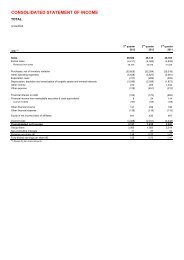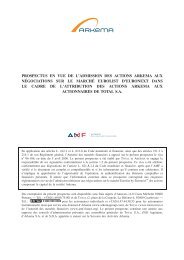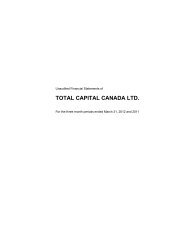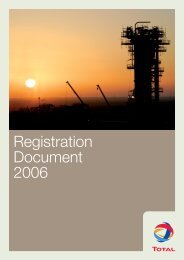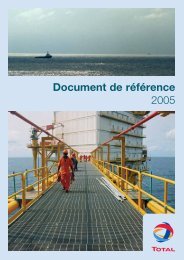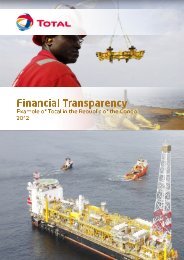Registration Document 2005 - Total.com
Registration Document 2005 - Total.com
Registration Document 2005 - Total.com
You also want an ePaper? Increase the reach of your titles
YUMPU automatically turns print PDFs into web optimized ePapers that Google loves.
9<br />
Appendix 1 – Consolidated financial statements<br />
Notes to the consolidated financial statements<br />
The financial data for 2004 and 2003 were presented under French<br />
GAAP in the 2004 Annual Report.<br />
1. Accounting policies<br />
The main consolidated financial statements have been prepared<br />
on a historical cost basis, except for some financial assets and<br />
liabilities that have been measured at fair value.<br />
The accounting policies used by the Group are described below.<br />
A. Principles of consolidation<br />
The subsidiaries that are directly controlled by the parent <strong>com</strong>pany<br />
or indirectly controlled by other consolidated subsidiaries are fully<br />
consolidated.<br />
Investments in jointly controlled entities are proportionately<br />
consolidated.<br />
Investment in associates, in which the Group has significant<br />
influence, are accounted for by the equity method. Significant<br />
influence is presumed when the Group holds, directly or indirectly<br />
(e.g. through subsidiaries), 20% or more of the voting rights.<br />
Companies in which ownership interest is less than 20%, but over<br />
which the Company has the ability to exercise significant influence,<br />
are also accounted for by the equity method.<br />
All significant inter<strong>com</strong>pany balances, transactions and in<strong>com</strong>e<br />
have been eliminated.<br />
B. Foreign currency translation<br />
The financial statements of subsidiaries are prepared in the<br />
currency that most clearly reflects their business environment. This<br />
is referred to as their functional currency.<br />
(i) Monetary transactions<br />
Transactions denominated in foreign currencies are translated at the<br />
exchange rate prevailing at the transaction date. At each balance<br />
sheet date, monetary assets and liabilities are translated at the<br />
closing rate and the resulting exchange differences are recognized<br />
in “Other in<strong>com</strong>e” or “Other expense”.<br />
(ii) Translation of financial statements denominated in foreign<br />
currencies<br />
Assets and liabilities of foreign entities are translated into euros<br />
on the basis of the exchange rates at the end of the period. The<br />
in<strong>com</strong>e and cash flow statements are translated using the average<br />
exchange rates of the period. Foreign exchange differences resulting<br />
from such translations are either recorded in Shareholders’ equity<br />
under “Cumulative translation adjustments” (for the Group share)<br />
or under “Minority interests” as deemed appropriate.<br />
170 TOTAL - <strong>Registration</strong> <strong>Document</strong> <strong>2005</strong><br />
C. Sales and revenues from sales<br />
Revenues from sales are recognized when the significant risks<br />
and rewards of ownership have been passed to the buyer and the<br />
amount can be reasonably measured. Sales figures include excise<br />
taxes collected by the Group within the course of its oil distribution<br />
operations. Excise taxes are deducted from sales in order to obtain<br />
the “Revenues from sales” indicator.<br />
Revenues from sales of crude oil, natural gas and coal are recorded<br />
upon transfer of title, according to the terms of the sales contracts.<br />
Revenues from the production of crude oil and natural gas<br />
properties in which the Group has an interest with other producers<br />
are recognized on the basis of the Group’s net working interest.<br />
Revenues from gas transport are recognized when the services<br />
are rendered, based on the quantities transported and measured<br />
according to procedures defined in each service contract.<br />
Revenues from sales of electricity, from refining and marketing<br />
activities and from the sales of chemicals products are recorded<br />
upon transfer of title, according to the terms of the related<br />
contracts.<br />
Revenues from services are recognized when the services have<br />
been rendered.<br />
Shipping revenues and expenses from charters activity are<br />
recognized ratably over the estimated length of each voyage.<br />
Voyages are calculated on a discharge-to-discharge basis.<br />
Shipping revenues recognition starts only when a Charter has been<br />
agreed to by both the Group and the customer.<br />
Oil and gas sales are inclusive of quantities delivered that represent<br />
production royalties and taxes when paid in cash and outside the<br />
US and Canada.<br />
Some transactions within the trading activities (contracts involving<br />
quantities that are purchased outside the Group then resold outside<br />
the Group) are shown at their net value in sales.<br />
Exchanges of crude oil and petroleum products within normal<br />
trading activities do not generate any in<strong>com</strong>e: flows are shown at<br />
their net value in both the in<strong>com</strong>e statement and the balance sheet.<br />
D. Share-based payments<br />
The Group applies IFRS 2 “Share-based payments” to employee<br />
stock option and share purchase plans and to employee-reserved<br />
capital increases. The benefits are determined at fair value by<br />
reference to the granted instruments.<br />
The fair value of the options is calculated using the Black & Scholes<br />
method at the grant date. The expense is allocated on a straightline<br />
basis between the grant date and vesting date.



